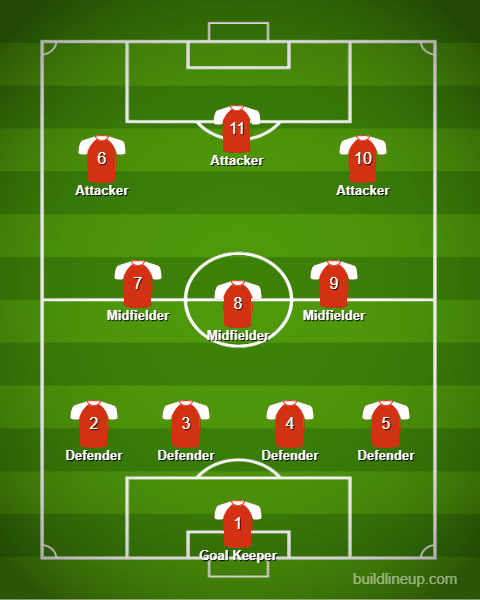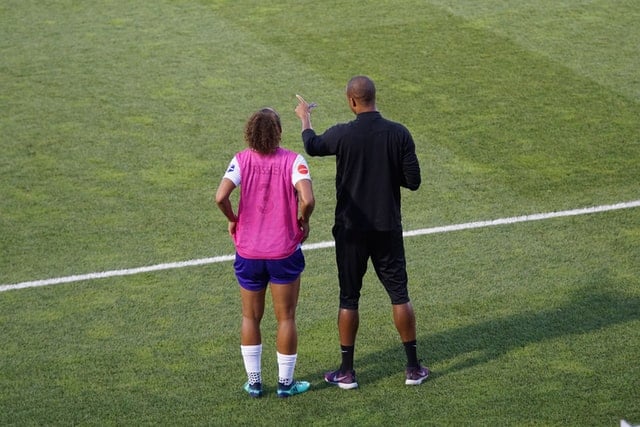Throughout my early years of watching soccer, I always wondered what the role of a soccer coach was.
I usually watched the coaches stand outside the field next to the sideline shouting and giving instructions to their players. However, I thought that the coaches didn’t have much impact on their team. I was wrong.
The more I dived into soccer, the more I learned about the roles of soccer coaches (aka managers) and their importance in shaping their team and leading it to greatness.
I also believe that not a lot of soccer fans realize the importance of soccer coaches and their roles in their teams. This is usually because we don’t see the coaches in action on the field. We see the players.
But in general, the way the players play is a reflection of their coach’s plans and tactics.
Note that in soccer, the words “Coach” and “Manager” usually refer to the same person. The person that we are discussing in this article. With that in mind, I will be using the terms interchangeably throughout the rest of the article.
What’s the main role of a soccer coach?
A soccer coach’s main role is to use the available players in the most efficient way possible on the field to win as many games as possible. Good soccer coaches know how to make the players complement each other’s skills on the field and place them in positions that maximize the team’s results.
In other words, a soccer coach is responsible for making sure that the players are delivering the best results that they can.
But how do they really do that? Well, here are the 6 main roles of the soccer coaches to ensure that their team wins as many games as possible.
- Setting plans, formations and tactics
- Deciding the players for the upcoming games.
- Making instant and impactful decisions during a game
- Overseeing practice sessions
- Guiding young talents
- Motivating the players
From what I have seen throughout years of watching and analyzing soccer games, these are the 6 main roles of coaches in soccer.
Next, I will be diving into each one of them in more detail.
1- Setting good plans, formations and tactics for the team.
Since the soccer field is very large, and since there are a lot of players on the field and a single ball, teams will have to set plans and tactics or else the soccer game will be a total mess.
Good plans, tactics and formations are fundamental for the success of any soccer team, and it is the responsibility of the soccer coach to find the perfect formations and plans for their team.
If you want to learn more about what soccer formations are, you can check this in-depth article about the subject. But in simple words, a formation is the way the players distribute themselves across the soccer field.

The soccer coach will have to use the best formation that fits the set of players that they have. Take Ronald Koeman as an example here.
Koeman joined FC Barcelona as a coach in summer 2020. Barcelona at that time were known for their excessive usage of the 4-3-3 formation.
However, Barcelona were struggling a lot. They went from one of the most feared soccer clubs in the world to a regular soccer club that can be defeated by mediocre teams.
The problem was Barcelona’s defence. Koeman saw that problem and he decided to break the 4-3-3 formation and instead go for a 3-5-2 formation for a period of time.
The new formation that Barcelona’s manager went for helped the team strengthen their defence and maintain their offensive skills. This change helped the team get back on their feet in that season and it helped them compete for titles.
This whole story is to tell you that the coach of a soccer team is responsible for finding the best formation for their team in order to yield the maximum results.
The same thing goes for tactics and plans. The way the team attacks, defends, and acts against strong opponents, is all decided by the team’s coach.
The coach will have to analyze every upcoming game for their team, and they have to deploy the proper plans and tactics accordingly.
For example, if the team is going to face an opponent that heavily relies on counter attacks, then the coach might decide to keep some of their team’s defense close to their goal and ready for any sudden counter attack from the opponent.
You get the point. A soccer coach is required to analyze every opponent that they face in order to deploy the needed tactics to win the game.
2- Deciding the players for the upcoming games.
The coach of a soccer team has the full control over which players will play during a soccer game. In other words, the coach decides the 11 starting players of the team during every single game.
There is a large number of players that play for a professional soccer club, and it is the coach’s job to pick a pool of 11 players to start the upcoming games.
So the coach is the person that picks the 11 starting players based on the opponent. For example, if the opponent is a strong one, the coach will play all of their cards and use the best players on the team.
However, if the opponent isn’t that strong, then the coach may decide to give a chance for the youngsters to play for the team and gain more experience on the field.
The coach also decides the substitutions during the game. They make the substitutions based on how the game is going.
For example, if the team is winning by a large difference, the coach might decide to substitute the best players just to give them a chance to rest and catch their breath.
However, if the team is losing, then they usually go for substitutions that strengthen the weak areas of the team.
Before we move on to the next point, one thing I think is worth mentioning here is the fact that a soccer player can refuse to be substituted during a soccer match.
In other words, if the coach decides that they want to substitute a player, and this player does not want to leave the field, then the referee does not have the right to force the player outside the field and the game will continue with the player in it.
However, it is extremely rare that a player refuses substitution, so I think it is safe to claim that the manager of the team has the full power to decide who gets substituted and who stays during the game.
3- Making instant and impactful decisions during a game
No matter how good a coach’s plans are, these plans might fall apart during a soccer game. The opponent might have surprises for the coach that leaves their plan completely useless.
In these scenarios, the role of the coach is to make instant decisions to save their team from a disaster.

Making instant decisions and changes while the game is going on can be one of the most difficult roles for a soccer coach. This is because they won’t have a lot of time to think. Every minute wasted can translate into another great scoring opportunity for the opponent.
In scenarios when the team is falling apart during a game, the coach will have to make quick substitutions to close the gaps.
The coach also has to make changes in their tactics on the fly. To make these changes, the coach usually signals the captain of the team to let them know about the changes needed, and then the captain will spread the word across the team players.
4- Overseeing practice sessions
During practice sessions, the team coach will usually be present to oversee the progress of the players and the drills that they are doing.
The coach also gives their insight and their experience during practice sessions.
Usually, professional soccer teams have some separate fitness coaches that are responsible for making sure that the players are doing the right amount of practice sessions, and that the players are doing the important exercises correctly and efficiently.
However, the team coach still has a lot to say when it comes to practice sessions. The coach can have a say in the frequency of the practice sessions and the kind of exercises done during the practice sessions.
So in simple words, the coach has a big role when it comes to practice sessions in soccer.
5- Guiding young talents
Young talents are the future of every soccer club. There are many soccer clubs that rise for a few years and then fall, but the clubs that remain on the top for a long period of time are the ones that take care of their youngsters.
In general, soccer players retire early compared to people from other professions, and this requires that the soccer clubs keep bringing in new talents to their team.
However, new talents usually require guidance and support. The new talents usually have what it takes to be great soccer players, but they sometimes lack the experience that other old soccer players have gained throughout the years.
This is when the coach of the team kicks in. One of the roles of the team’s coach is to help the new talents gain the experience needed on the field.
The coach does this by giving the young players a chance on the field whenever possible, and by taking extra care of these young players during practice sessions.
The coaches also give advice and motivation to the young players. They pass down all the knowledge that they have gained throughout their years of playing soccer and coaching other players.
Before we move on to the final point in this article, I think it is worth mentioning that the big soccer clubs usually send some of their young soccer players on a loan just to help them gain experience outside of the club.
This usually happens when the coach of the team decides that the young players are not yet fit to participate in a large number of matches with the team.
6- Motivating the players
While motivating the players of a soccer team isn’t just the responsibility of the soccer coach, the coach still plays a huge role when it comes to the players’ motivation.
I think you already know that having motivated players on your team can have a great effect on the team’s performance.
Motivated players push themselves to give the best performances they can.
With that in mind, the coaches are responsible for keeping the player’s motivation as high as possible.
But how do they do that? They do it by trusting the players and acknowledging their hard work. In general, the players will try their best to impress their coach because it is the coach that decides whether the players are good enough for the team or not.
With that said, the coach can give free motivation for the players only by acknowledging their hard work on the field and off the field.
Players that are constantly playing on the field and players that are constantly getting compliments from their coach might be more motivated than the players that get neglected all the time.
In simple words, the coach is one of the people responsible for keeping all players motivated by giving them a chance on the field and by encouraging them to do their best whenever they can.
With that said, I will end my article here. Here is a quick summary of what you have just read.
SUMMARY
The soccer coach position is one of the most important positions in a club. The coach is responsible for planning ahead of the upcoming games, deciding who plays and who doesn’t, making instant decisions during a game, encouraging the players and so much more.

